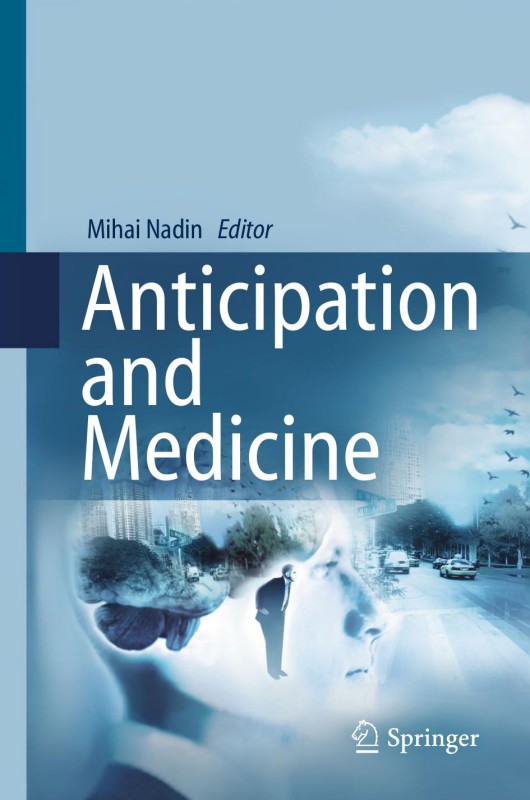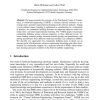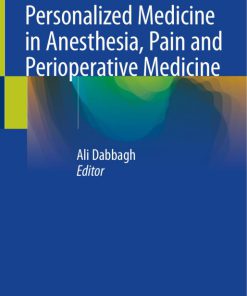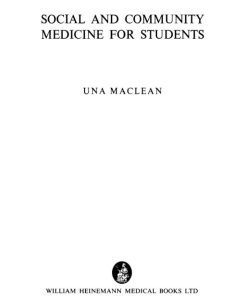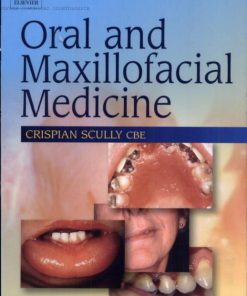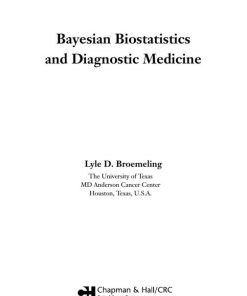Anticipation and Medicine 1st Edition by Mihai Nadin ISBN 3319451421 9783319451428
$50.00 Original price was: $50.00.$25.00Current price is: $25.00.
Authors:Mihai Nadin , Author sort:Nadin, Mihai , Ids:Goodreads , Languages:Languages:eng , Published:Published:Nov 2016 , Publisher:Springer
Anticipation and Medicine 1st Edition by Mihai Nadin – Ebook PDF Instant Download/Delivery. 3319451421, 9783319451428
Full download Anticipation and Medicine 1st Edition after payment

Product details:
ISBN 10: 3319451421
ISBN 13: 9783319451428
Author: Mihai Nadin
In this book, practicing physicians and experts in anticipation present arguments for a new understanding of medicine. Their contributions make it clear that medicine is the decisive test for anticipation. The reader is presented with a provocative hypothesis: If medicine will align itself with the anticipatory condition of life, it can prompt the most important revolution in our time. To this end, all stakeholders—medical practitioners, patients, scientists, and technology developers—will have to engage in the conversation. The book makes the case for the transition from expensive, and only marginally effective, reactive treatment through “spare parts” (joint replacements, organ transplants) and reliance on pharmaceuticals (antibiotics, opiates) to anticipation-informed healthcare. Readers will understand why the current premise of treating various behavioral conditions (attention deficit disorder, hyperactivity, schizophrenia) through drugs has to be re-evaluated from the perspective of anticipation. In the manner practiced today, medicine generates dependence and long-lasting damage to those it is paid to help. As we better understand the nature of the living, the proactive view of healthcare, within which the science and art of healing fuse, becomes a social and political mandate.
Anticipation and Medicine 1st Table of contents:
1 Medicine: The Decisive Test of Anticipation
Abstract
1 Preliminaries
1.1 A Question of Scientific Legitimacy
1.2 Life Is About Meaning
1.3 Man-Machine
1.4 Holism
1.5 Clarity: The Premise for Dialog
1.5.1 From Cradle to Grave
1.5.2 Conceptual Premises
1.6 A Questionable Ultimate Aim
1.7 Bringing Together
2 Complexity and Anticipation
3 “G-Complexity”—Where Medicine Starts
3.1 Complex Versus Complicated
4 Turning Ideas into Actions
Acknowledgments
References
Anticipation and Medical Care
2 A Conceptual Framework for Applying the Anticipatory Theory of Complex Systems to Improve Safety a
Abstract
1 Introduction
2 Anticipatory Systems
2.1 Feedforward and Feedback
3 Simple and Complex Systems
3.1 Stability of Anticipatory Complex Systems
4 Application to Improving Safety and Quality in Healthcare
4.1 Education for Clinical Teams
4.2 Education for Patients and Families
4.3 To Do List for Healthcare Institutions
4.4 Measurement Possibilities
5 Conclusions
References
3 Environment, Genes, and Mental Health
Abstract
1 Anticipating Depressive Disorders
2 Risk Factors
2.1 Resilience
2.2 Gene-Environment Interaction
2.3 The Serotonin Transporter (5-HTT) Gene
3 Individualized Medicine
References
4 The Anticipating Heart
Abstract
1 Background
1.1 Quantitative Perception of the Heartbeat
1.2 Associative Anticipation
2 The Heart-Brain Connection
3 Cardio-Rhythm Evaluation
4 Heart-to-Brain Signals
4.1 Fragmentation Coefficient
5 Cognitive Complexity
6 Time Marking
Acknowledgments
References
Evaluating the Risk Factors and Opportunities of New Medical Procedures
5 Predictive, Preventive and Personalised Medicine as the Medicine of the Future: Anticipatory Scien
Abstract
1 Introduction: Time for New Guidelines in Healthcare
2 Healthcare of the Future: Predictive, Preventive and Personalised Medicine
3 Focus on the Patient: Promotion of the Concepts of Participatory Medicine
4 The Integrated View of PPPM
4.1 The Paradigm Shift from “unPPPM” to “PPPM”
5 Specific Areas of PPPM Application
5.1 Cancer: The Key Question Puzzling PPPM
5.2 Cardiovascular Disease (CVD) as One of the Major Targets for PPPM
5.3 Diabetes Pandemic: A 21st Century Disaster and PPPM Solutions
5.4 Neurological, Neuropsychiatric and Neurodegenerative Diseases (NNND)
5.5 Rare Diseases (RDs): Proof-of-Principles for PPPP Concepts
5.6 Traditional Medicine: Past or the Future?
5.7 Pain Management: Multidisciplinarity and Benefits for All Medical Fields
5.8 Oral/Dental Health Contributes to the Overall Health and Well-Being of Everybody
5.9 Transplantation and Regenerative Medicine
5.10 A Sensitive Balance Between Health and Disease: The Role of Environment and Clinical Nutrition
5.11 PPPM in Body Culture and Sports Medicine (BCSP)
5.12 Translational Medicine Bridges Basic Science and Implementation of PPPM Concepts
5.13 Information and Communication Technologies (ICT)
5.14 Innovative Technologies (IT)
5.15 Pharmacogenetics
6 The Role of the Laboratory Medicine
6.1 Biomarking and Biobanking
6.2 Medical Chemistry
7 Towards an Effective PPPM Promotion
7.1 Design
7.2 Education
7.3 Advanced Business Models for Healthcare
8 From “Passively Performing” to “Actively Advising”
References
6 Next Generation Sequencing for Next Generation Diagnostics and Therapy
Abstract
1 Introduction
2 The Advent of NGS Technologies
3 Limits of NGS Applications
4 Third-Generation Sequencing
5 Clinical Analysis of the Human Genome Sequence
6 Population-Scale Sequencing Projects
7 NGS and Precision Medicine
8 Future Perspectives
References
Examining the Brain
7 Temporal Memory Traces as Anticipatory Mechanisms
Abstract
1 Introduction
2 Anticipatory Systems
2.1 Purposive Systems as Functional Organizations
2.2 Anticipatory Systems in Animals with Nervous Systems
2.3 Organization of Perception and Action
2.4 General Types of Functional Organizations
2.5 Hylomorphism as an Ontology for Functional Organization
3 Anticipation and Memory
3.1 Short- and Long-Term Memory
3.2 Music, Memory, and Anticipation
3.3 Mismatch Negativity and Short-Term Expectancies
3.4 Temporal Theories of Associative Memory
4 A Temporal Theory of Brain Function
5 A Universal Coding Framework Based on Complex Temporal Spike Patterns
5.1 The Neural Coding Problem
5.2 Types of Neural Codes: Channel Codes and Temporal Codes
5.2.1 Types of Temporal Codes
5.2.2 Evidence for Temporal Codes
6 Neural Architectures for Temporal Processing
6.1 Basic Plan of the Brain
6.2 Neural Time-Delay Architectures
6.3 Neural Timing Network Architectures
7 Temporal Mechanisms for Short-Term Regenerative Memory
8 Temporal Mechanisms for Long-Term Memory
8.1 Formation of Time-Delay Networks for Recognizing and Producing Temporal Patterns
8.2 Polymer-Based Time-Space Molecular Memory for Storing Temporal Patterns
9 Conclusions
References
8 Influence of the Cerebellum in Anticipation and Mental Disorders
Abstract
1 Introduction
2 Cerebellar Functions, Pathologies, and Symptoms
3 Motor Cognition, Cerebellar Plasticity and Anticipation
4 Spatial Cognition, Cerebellum and Anticipation
5 Emotional Reactivity, Cerebellum, and Anticipation
6 Cerebellar Anticipation Deficits in Psychiatric Disorders: A Consensus?
References
9 Anticipation and the Brain
Abstract
1 Prediction
2 A Hypothesis
3 Imprinting—Beyond Lorentz’s Ducks
4 The Need for a New Framework
4.1 Complementarity
4.2 Decidability
5 The Brain Is What We Do
5.1 A Central yet Distributed Activity
6 Laws and Records
6.1 What Do We Want to Know?
6.2 Creativity and Engineering
6.3 The Holistic View
7 Relevance
Acknowledgments
References
Anticipation and Medical Data Processing
10 The Role of MHealth and Wearables for Anticipation in Medicine
Abstract
1 Introduction
2 Anticipation in Medicine
2.1 Mobile Health (MHealth) Advantages for Patient and Clinician
2.2 How Valuable Is Anticipation? Can It Improve Medical Care?
3 Users of MHealth Technology
4 FDA Regulation of Medical Devices, Wearables, and Applications
4.1 FDA Guidelines
4.2 Data Security
4.3 Electronic Medical Records
5 Current Devices, Mobile Applications, and Commercial Companies
5.1 Gamification and Interactivity
5.2 Usability
6 New Commercial Opportunities
7 Data Management, Analysis, Application
7.1 Processing Big Data
8 Conclusions
8.1 Anticipation
8.2 Anticipating New Challenges
References
11 Coaching of Body Awareness Through an App-Guide: The HealthNavigator
Abstract
1 Introduction
2 Requirements
3 HealthNavigator
3.1 Concept
3.2 Health Status Monitoring
3.3 Touristic Navigation
4 Evaluation
5 Discussion
Acknowledgments
References
Anticipation and Psychological Aspects of Patient Treatments
12 Anticipation and Child Development
Abstract
1 Introduction
1.1 Observing Anticipatory Behavior
2 Anticipation—A Working Definition
3 Typical Child Development
3.1 Evidence of Anticipation
3.1.1 Reaching for an Object
3.1.2 Anticipation in Social Situations
4 Development of Infants with Autism
4.1 Autism and Social Interaction
4.2 Autism and Timely Diagnosis
4.3 Open Questions
5 Practical Considerations: How Does This Information Help?
References
13 Anticipation and the Neural Response to Threat
Abstract
1 Anticipatory Response
2 Threat-Elicited Response
3 Neural Substrates of Anticipatory and Threat-Elicited Responses
4 Understanding Internalizing Disorders
5 Conclusion
References
Anticipation and Ubiquitous Computing
14 Smart Watches for Physiological Monitoring: A Case Study on Blood Pressure Measurement
Abstract
1 Introduction
2 Background
2.1 The BioWatch
2.2 Innovative Aspects
2.2.1 Definition of PTT
3 Hardware Description
4 Methods
4.1 Measuring Reference BP
4.2 Translating PTT to BP
4.3 Position Detection
5 Experimental Setup
5.1 Measurement Procedure for PTT-BP
5.2 Protocol for PTT-BP Study
5.3 Protocol Used for Development of Arm Position Classifier
6 Discussion and Results
6.1 Correlation Between PTT and BP
6.2 Change in PTT and SBP During Posture Changes
6.3 Root Mean Square Error
6.4 Individual-Specific and Posture-Specific Training
6.5 Position Detection Accuracy
7 Conclusion
References
15 Anticipatory Mobile Digital Health: Towards Personalized Proactive Therapies and Prevention Strat
Abstract
1 Introduction
1.1 Anticipatory Mobile Computing
2 Mobile Sensing for Healthcare
2.1 Advantages of Mobile Sensing Devices
2.2 The User’s Role
2.3 A Plethora of Smart Devices
2.4 Future Steps
3 Anticipatory Mobile Computing
4 Anticipatory Healthcare System Architecture Design
5 Challenges and Opportunities
5.1 Machine Learning in Anticipatory Mobile Digital Health
5.1.1 First, a Model of a User Current and Projected Future Health State is Needed
5.1.2 Second Major Machine-Learning Model
5.1.3 Learning with a User
5.1.4 Measuring Health State
5.1.5 Learning Without Interfering
5.2 Personalized Healthcare
5.3 HCI Issues in Anticipatory Mobile Digital Health
5.4 Ethics and Accountability
6 Conclusions
Acknowledgments
References
16 Intelligent Support for Surgeons in the Operating Room
Abstract
1 Introduction
2 State of the Art
3 Towards Intelligent Support in the Operating Room
3.1 How to Identify What Information the Surgeon Needs
3.2 Adapting Pre- and Intra-procedure Information to the Surgical Situation
3.3 Presenting Relevant Information to the Surgeon
4 Building Intelligent Interactive Information Systems for the OR
5 Discussion and Conclusions
Acknowledgements
References
Anticipation and Alternative Medicine
17 Unorthodox Forms of Anticipation
Abstract
1 Introduction
2 Methods
2.1 Forced-Choice Tasks
2.2 Free-Response Tasks
2.3 Dream Experiments
2.4 Implicit Behavioral Responses
2.5 Physiological Responses
3 Discussion
Acknowledgments
References
18 Anticipating Diabetes, Obesity and Polycystic Ovarian Syndrome and Applying Integrative Technique
Abstract
1 Introduction
1.1 Costs Associated with Obesity and Type 2 Diabetes
1.2 Complications and Risk Factors
2 Associated Physiological Phenomena in Patients with Insulin Resistance and Reactive Hypoglycemia
3 Functional and Oriental Medicine
4 Preventing Obesity and Type 2 Diabetes—Anticipatory Approaches
4.1 Diet
4.2 Oriental Medicine
4.3 Other Anticipatory Approaches
References
19 Anticipating the Diagnosis of Breast Cancer: Screening Controversies and Warning Dreams
Abstract
1 Introduction
2 Benefits of and Problems with Current Screening Methods
2.1 Mammography
2.2 Magnetic Resonance Imaging
2.3 Ultrasound
2.4 Thermography
2.5 Genetic Screening
3 Warning Dreams
4 Conclusions
References
20 Anticipation in Traditional Healing Ceremonies: The Call from Our Past
Abstract
1 Introduction
2 Anticipation in Human Motor Action
3 New Approaches for Anticipatory Systems. Building Bridges Between Biological and Technical Systems
3.1 Assistive Glasses
3.2 The Role of Technical Systems
4 Traditional Healing Ceremonies
4.1 Native American Ceremonies: Sweat Lodges
4.1.1 Respect for Time and Nature
4.1.2 Creating a Healing Space
4.1.3 Transformation
4.1.4 Spirit Guides and Animal Spirits
4.2 Afro-American and Afro-Cuban Ceremonies: Santería, Palo
4.2.1 Nature
4.2.2 Healing Space
4.2.3 Transformation
4.2.4 Spirit Guides
5 Conclusions
Acknowledgments
References
21 At the Meeting Point Between Anticipation and Chiropraxis
Abstract
1 A Not Unusual Example
2 The Importance of the Vertebral Column
3 The Propeller Mechanism—An Anticipatory Function
3.1 The Role of Gravity
3.2 The Role of Change
3.3 Avoid the Error of Simplifications
4 Chiropractic: The Art of Healing Informed by Science
4.1 Intelligence and Energy
4.2 The Turning Point
5 A Difficult Science
6 Concluding Considerations
References
22 Anticipation in Motion-Based Games for Health
Abstract
1 Introduction
2 State of the Art
3 Towards Adaptive Ad Personalized Interactive MGH
4 Components of Adaptive Exergames
4.1 Sensor Technologies for Adaptive Exergames
4.2 Psycho-Physical User Models
4.3 Adaptation Strategy
5 Building Adaptive Exergames
6 Towards Anticipatory Exergames
7 Conclusions and Discussion
Acknowledgments
References
23 Erratum to: Anticipatory Mobile Digital Health: Towards Personalized Proactive Therapies and Prev
Erratum to:Chapter “Anticipation Mobile Digital Health: Towards Personalized Proactive Therapi
People also search for Anticipation and Medicine 1st:
anticipation and medicine
anticipation medicine
anticipation anxiety meditation
anticipation and anxiety
anticipatory medicines are prescribed
You may also like…
eBook PDF
Forensic Medicine and Toxicology for MBBS 1st Edition by Anil Aggrawal ISBN 8177394916 9788177394917
eBook PDF
Social and Community Medicine for Students 1st Edition by Una MacLean ISBN 9781483182995 148318299X
eBook PDF
Oral and maxillofacial medicine 1st Edition by Crispian Scully CBE ISBN 0723610746 9780723610748

